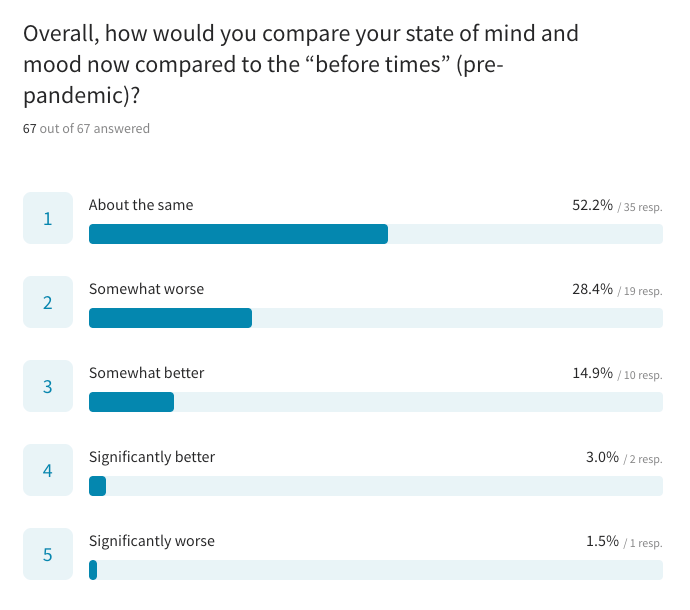Unscientific Survey: Mental Health
Thank you for sharing. Our latest Unscientific Survey asked you to report on your mental health over the last year and a quarter, and we appreciate those who responded. A slim majority reported they felt about the same, while more than a quarter said things were “somewhat worse.”
As one person commented, “Between Trump/ism and Covid, I found it very hard not to lose hope this year.” Another said, “I might have sought therapy, but I was already in it.” (The reader added: “At one point last fall, a friend said to me, ‘No one is getting through this pandemic without therapy.’ Of course, she meant no one who could afford it.”)
The survey results were roughly in accord with national studies. In one of them, conducted by the Centers for Disease Control (swat.ink/CDC-mental-health), “31% of respondents reported symptoms of anxiety or depression, 13% reported having started or increased substance use, 26% reported stress-related symptoms, and 11% reported having serious thoughts of suicide in the past 30 days. These numbers are nearly double the rates we would have expected before the pandemic.”
Last month, Wharton professor Adam Grant wrote a widely quoted piece in the New York Times (swat.ink/languishing) that attempted to more precisely characterize the malaise that many of us have felt:
“It wasn’t burnout — we still had energy. It wasn’t depression — we didn’t feel hopeless. We just felt somewhat joyless and aimless. It turns out there’s a name for that: languishing.
“Languishing is a sense of stagnation and emptiness. It feels as if you’re muddling through your days, looking at your life through a foggy windshield. And it might be the dominant emotion of 2021.”
A couple of weeks later, the Times published a piece about the opposite of languishing: flourishing. It defined this as living with a “sense of fulfillment, purpose and happiness,” and offered some tips on how to get there. We recommend you check the article out at swat.ink/flourishing.
Meanwhile, some readers seem to have gotten a head start. About 18% of respondents said they were doing somewhat or significantly better since the start of the pandemic. Well done: you’re admirable models for us all.
Note: A list of mental health organizations and professionals, both local and national, is available here.





